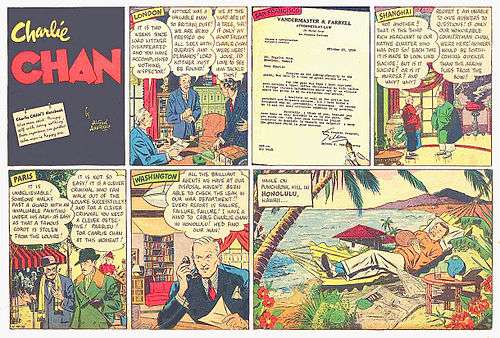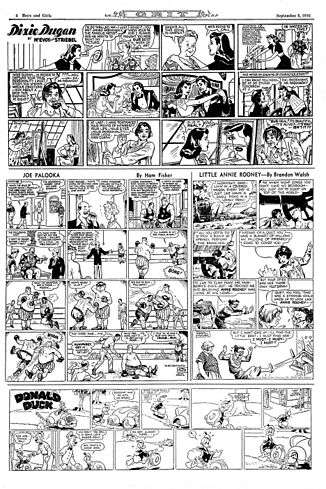McNaught Syndicate

The McNaught Syndicate (1922–1989) was an American newspaper syndicate founded in 1922. It was established by Virgil Venice McNitt (who gave it his name) and Charles V. McAdam. Its best known contents were the columns by Will Rogers and O. O. McIntyre, the Dear Abby letters section and comic strips, including Joe Palooka and Heathcliff. It folded in September 1989.
History
Virgil McNitt (1881–1964) first tried his hand at publishing a magazine, the McNaught Magazine, which failed.[1] He then started the Central Press Association in Cleveland, Ohio.[2]
In 1922, McNitt and Charles V. McAdam (1892–1985) transformed the Central Press Association into the McNaught Syndicate with headquarters in The New York Times building.[3][4] Will Rogers' weekly column started in 1922 in 25 newspapers. By 1926, his daily column ran in 92 newspapers, and it reached 400 papers three years later, making him one of the best paid and most read columnists of the United States at the time.[5] Writers syndicated by McNaught in those first years included Paul Gallico, Dale Carnegie, Walter Winchell and Irvin S. Cobb.[6] By the early 1930s, the McNaught Syndicate had a stable which included columnists O. O. McIntyre and Al Smith and at one time even syndicated a letter by Albert Einstein.[7] From 1925 until 1951, Charles Benedict Driscoll was one of the editors and contributors for the syndicate.[8]
Comic strips
One of the first syndicated artists was Rube Goldberg. McNaught's line-up of comic strips included Mickey Finn and Dixie Dugan. Ham Fisher's Joe Palooka was at first rejected by McNitt, but Fisher was hired as a salesman for the syndicate, offering McNaught's features to newspapers. After having sold his comic to 20 newspapers, McNitt had to change his opinion and added Joe Palooka to the syndicate, becoming one of the big successes for it.[9]
From 1937 until 1939, many of the syndicate's comic strips were reprinted in the comic book anthology Feature Funnies. In 1939, the syndicate hired Vin Sullivan, then editor of Action Comics, to start a new comics publishing company, Columbia Comics, which would carry both new comics and reprints of McNaught syndicated comics like Joe Palooka. The company existed until 1949 and is best remembered for their publication Big Shot Comics.[10]
Other successes included columns by Dale Carnegie and Dear Abby by Abigail Van Duren. At the time of McNitt's death in 1964, the syndicate was still led by McAdam, providing contents to 1,000 newspapers.[3]
The syndicate continued columns and strips which were already successful when acquired, but it also was active in creating and suggesting new content, from the Will Rogers columns to comic strips like Don Dean's Cranberry Boggs.[11] In one case, McNitt supported a crossover between the comic strips Joe Palooka and Dixie Dugan, a feat which was commented upon by Editor & Publisher.[12]
Their last success came with the comic strip Heathcliff, which they syndicated from the start in 1973 until the late 1980s. Heathcliff appeared in some 1,000 newspapers, and the McNaught Syndicate became the production company for a few Heathcliff movies, including Heathcliff: The Movie from 1986.[13] By 1987, McNaught had only 24 features left, making it the tenth largest comic strip syndicate in the United States at that time.[14] The syndicate eventually folded in September 1989.[15]
Main syndicated content
Columns

- Holmes Moss Alexander, from 1947 until 1981[16]
- Jimmy Fidler with Jimmy Fiddler in Hollywood, a gossip column carried by 187 newspapers[17]
- Sir Philip Gibbs and Hendrik Willem van Loon, both reporting on the Second World War[18]
- The Great Game of Politics by Frank Richardson Kent, appearing in 140 newspapers in 1934[19]
- Alice Roosevelt Longworth, appearing in 100 newspapers in 1936[20]
- The Lyons Den by Leonard Lyons, taken over from the King Features Syndicate in 1941: appeared in some 20 newspapers[21]
- New York Day by Day by O. O. McIntyre, "probably the most widely read columnist in the U.S.", appeared in some 400 newspapers[22] After McIntyre's death in 1938, the column was continued by editor Charles Driscoll until 1951.[23]
- The State of The Nation by professor Raymond Moley[1]
- Dear Abby by Pauline Phillips was syndicated by McNaught from 1956 until 1966, when it was taken over by the Chicago Tribune syndicate[24] By 1957, it ran in about 80 newspapers.[25]
- "Will Rogers Says", a daily column by Will Rogers, appearing in 500 newspapers by 1935[26]
- Eleanor Roosevelt in 1934, with limited success[27]
- Louis Rukeyser, economic columnist, from 1976 to 1986[28]
- Major Alexander Procofieff de Seversky, syndicated in 85 newspapers[29]
- a weekly feature by Al Smith between 1931[30] and 1932:[31] appeared in some 70 newspapers by 1931[32]
- New York by John Cameron Swayze, appearing in 50 newspapers in 1951[33]
- Andrew Tully, from 1969 on, with more than 150 subscribing newspapers[34]
- Walter Winchell
Comic strips and cartoons
- Cartoons by Rube Goldberg, including Boob McNutt, appeared in over 200 newspapers from 1922 until 1934[35]
- Editorial cartoons by Reg Manning, syndicated by McNaught from 1948 to 1971, winner of the Pulitzer Prize for Editorial Cartooning in 1951[36]
- Some comic strips based on popular animated TV series, including Yogi Bear and The Flintstones[37] by Gene Hazelton
- The Bungle Family by Harry J. Tuthill, created in 1918, syndicated by McNaught from 1924 until 1945[38]
- Charlie Chan by Alfred Andriola, an adaptation of the novels which ran between 1938 and 1942[39]
- Cranberry Boggs by Don Dean
- Dixie Dugan by J. P. McEvoy and John H. Striebel: 1929–1966[40]
- Heathcliff by George Gately, created in 1973, was originally syndicated by McNaught before switching to Tribune Media Services and later Creators Syndicate[41]
- Hoosegow Herman, a daily comic strip by Wally Wallberg, appeared in 22 newspapers from 1938 on[42]
- The Jackson Twins by Dick Brooks, from 1950 until 1979[43]
- Joe Palooka by Ham Fisher: 1930–1984, appeared in some 650 newspapers in 1959[44]
- Johnny Comet by Frank Frazetta and Earl Baldwin, 1952–1953[45]
- Mickey Finn by Lank Leonard, 1936–1976, ran at its peak in more than 300 newspapers[46]
- That'll Be the Day
- This Funny World gag cartoons (1945–1985)
- Toonerville Folks by Fontaine Fox, which ran from 1908 until 1955. When syndicated by McNaught from the 1930s on, it ran in about 300 newspapers[47]
Notes
- 1 2 "Today". Time. 1933-09-11. Retrieved 2008-09-04.
- 1 2 "McNitt obituary". Time. 1964-06-26. Retrieved 2008-09-04.
- ↑ Rogers, Will (2005). The Papers of Will Rogers. University of Oklahoma Press. p. 277. ISBN 978-0-8061-3704-9.
- ↑ Yagoda, Ben (2000). Will Rogers: A Biography. University of Oklahoma Press. p. 248. ISBN 978-0-8061-3238-9.
- ↑ Robinson, Ray (1996). American Original: a life of Will Rogers. Oxford University Press US. p. 158. ISBN 978-0-19-508693-5.
- ↑ "Stablemates". Time. 1931-03-21. Retrieved 2008-09-04.
- ↑ Riley, Sam G. (1994). Biographical Dictionary of American Newspaper Columnists. Popular Press. p. 71. ISBN 978-0-87972-630-0.
- ↑ Caplin, Elliot (1995). Al Capp Remembered. Greenwood Publishing Group. p. 75. ISBN 978-0-313-29192-0.
- ↑ "Tom-Tom, Vol. 1, No. 2". Oddball Comics. Retrieved 2008-09-05.
- ↑ Waugh, Coulton; Inge, M. Thomas (1991). The Comics. Univ. Press of Mississippi. p. 240. ISBN 978-0-87805-499-2.
Don Dean, its creator, credits Charles V. McAdam, President of theMcNaught Syndicate, with being the guiding light of the strip
- ↑ Stephen J., Monchak (1940-02-17). "Editors Split on Fusion of 'Strips'". Editor & Publisher. Retrieved 2008-09-05.
- ↑ "McNaught Syndicate". IMDb. Retrieved 2008-09-05.
- ↑ Alexander, Katina (1987-06-14). "A Superhero for Cartoonists". The New York Times. Retrieved 2008-09-05.
- ↑ "Family offers plenty of fodder to journalist's quick wit". Ohio University Today. 1998. Retrieved 2008-09-05.
- ↑ Riley, Sam G. (1995). Biographical Dictionary of American Newspaper Columnists. Greenwood Publishing Group. p. 7. ISBN 978-0-313-29192-0.
- ↑ Barbas, Samantha (2005). The First Lady of Hollywood. University of California Press. p. 185. ISBN 978-0-520-24213-5.
- ↑ "Fair-Haired Boys". Time. 1939-10-02. Retrieved 2008-09-04.
- ↑ Riley, Sam G. (1995). Biographical Dictionary of American Newspaper Columnists. Greenwood Publishing Group. p. 155. ISBN 978-0-313-29192-0.
- ↑ "My Day". Time. 1936-01-13. Retrieved 2008-09-04.
- ↑ "Lyons' New Den". Time. 1941-06-30. Retrieved 2008-09-04.
- ↑ "Columnists v. Columnist". Time. 1935-07-08. Retrieved 2008-09-04.
- ↑ "Obituary". Time. 1951-01-29. Retrieved 2008-09-04.
- ↑ "Syndicate Wars". Time. 1977-09-12. Retrieved 2008-09-04.
- ↑ "Sister Confessors". Time. 1957-01-21. Retrieved 2008-09-04.
- ↑ "Breeches Boys". Time. 1936-10-05. Retrieved 2008-09-04.
- ↑ Beasley, Maurine Hoffman (1987). Eleanor Roosevelt and the Media. University of Illinois Press. p. 71. ISBN 978-0-252-01376-8.
- ↑ Sleeman, Elisabeth (2003). International Who's Who of Authors and Writers 2004. Routledge. p. 483. ISBN 978-1-85743-179-7.
- ↑ "New Columnist". Time. 1943-04-10. Retrieved 2008-09-04.
- ↑ "Colyumist Smith". Time. 1930-11-24. Retrieved 2008-09-04.
- ↑ "New Outlook". Time. 1932-08-29. Retrieved 2008-09-04.
- ↑ "Sunday Stuff". Time. 1931-01-12. Retrieved 2008-09-04.
- ↑ "Eager Beaver". Time. 1951-06-11. Retrieved 2008-09-04.
- ↑ Riley, Sam G. (1995). Biographical Dictionary of American Newspaper Columnists. Greenwood Publishing Group. p. 331. ISBN 978-0-313-29192-0.
- ↑ "Lala Palooz". Time. 1936-11-09. Retrieved 2008-09-04.
- ↑ Brennan, Elizabeth A.; Clarage, Elizabeth C.; Topping, Seymour (1999). Who's Who of Pulitzer Prize Winners. Greenwood Publishing Group. p. 145. ISBN 978-1-57356-111-2.
- ↑ Lenburg, Jeff (2006). Who's Who in Animated Cartoons. Hal Leonard. p. 135. ISBN 978-1-55783-671-7.
- ↑ "The Bungle Family". Toonopedia. Retrieved 2008-09-05.
- ↑ Waugh, Coulton; Inge, M. Thomas (1991). The Comics. Univ. Press of Mississippi. p. 295. ISBN 978-0-87805-499-2.
- ↑ "Dixie Dugan". Toonopedia. Retrieved 2008-09-05.
- ↑ "Heathcliff". Toonopedia. Retrieved 2008-09-05.
- ↑ "Wally Returns". Time. 1938-10-17. Retrieved 2008-09-04.
- ↑ "The Jackson Twins". Toonopedia. Retrieved 2008-09-05.
- ↑ "Joe Palooka's Future". Time. 1959-09-14. Retrieved 2008-09-04.
- ↑ "McNaught Syndicate Offers Auto-racing Strip". Editor & Publisher. 1952. Retrieved 2008-09-05.
- ↑ Reynolds, Moira Davison (2003). Comic Strip Artists in American Newspapers, 1945–1980. McFarland. p. 56. ISBN 978-0-7864-1551-9.
- ↑ "Toonerville Folks". Toonopedia. Retrieved 2008-09-05.